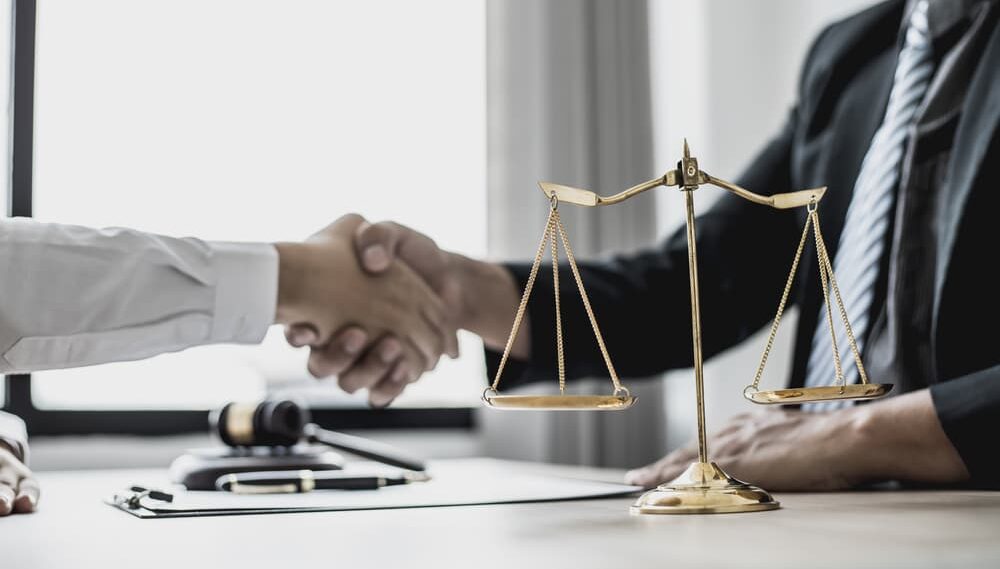
After a motorcycle accident, one main decision you need to make is whether to hire a motorcycle accident lawyer. The short answer is yes, and several compelling reasons exist for this.
Moving Your Case Through the Legal System
Motorcycle accidents often lead to complex legal situations. Navigating the legal system, understanding your rights, and knowing the intricacies of motor vehicle laws can be challenging.
A lawyer familiar with these cases will handle the legal side of your case for you. They will file your claim, prepare all necessary documentation, and ensure that legal procedures are followed correctly.
Dealing with Insurance Companies
Dealing with insurance companies is a central part of the process after a motorcycle accident. While necessary in the claims process, these companies often aim to settle claims for as little payout as possible.
This is where having a lawyer becomes beneficial, as they negotiate with these companies to ensure you receive fair and adequate compensation.
Insurance companies use different strategies when handling claims, especially those involving significant injuries and potential high payouts. They may attempt to downplay the severity of your injuries or argue that certain costs are not directly related to the accident.
In some cases, they might even dispute liability, trying to shift some or all the blame onto you, the victim. These tactics are designed to reduce the amount they have to pay, protecting their financial interests.
A lawyer experienced in dealing with motorcycle accident claims knows how to handle these tactics. They come prepared with a deep understanding of insurance law and the typical strategies used by these companies.
They can help counter lowball offers and ensure that the compensation you receive is reflective of the true extent of your damages.
One of the critical roles of your lawyer in these negotiations is to provide a comprehensive breakdown of all your damages. This includes the obvious expenses like medical bills and repairs to your motorcycle and more nuanced costs.
They will consider long-term medical care, potential future surgeries or treatments, ongoing therapy, and rehabilitation costs. Additionally, they will factor in current and future lost income, especially if your injuries affect your ability to return to work or require a change in your professional path.
Also, your lawyer will advocate for compensation covering non-economic damages, often overlooked in initial insurance offers. These can include pain and suffering, emotional distress, and the overall impact on your quality of life. While not as easily quantifiable as medical bills, these aspects are equally important in understanding the accident’s full impact on your life.
Throughout this process, your lawyer’s negotiation skills are useful. They understand how to effectively communicate your needs and justify the compensation you are seeking. They know when to push back against an unfair offer and when to advance the negotiation towards a more favorable outcome.
Dealing with insurance companies after a motorcycle accident is a complex and challenging task that requires skill, patience, and a thorough understanding of insurance and personal injury law.
Your lawyer acts as your advocate and shield in these negotiations, working diligently to ensure you receive a settlement that fully compensates for your injuries and losses. This support is valuable in allowing you to focus on your recovery, knowing that the financial aspects of your accident are being handled with care and skill.
Evaluating Your Claim
Regarding a motorcycle accident, the repercussions often extend far beyond the incident’s immediate aftermath. Evaluating your claim in such a scenario is a process that requires a comprehensive understanding of the various ways the accident has affected your life.
This is where a lawyer ensures that the compensation you seek truly reflects the extent of your losses.
The evaluation of your claim starts with assessing the direct costs associated with the accident. This includes the immediate medical bills and the cost of ongoing medical care. In cases of serious injuries, this might involve long-term treatments, surgeries, rehabilitation, and any required medical equipment.
Your lawyer will gather and review all medical records and expenses to ensure that every aspect of your medical treatment is accounted for.
However, the impact of a motorcycle accident is often more than just physical injuries and the associated medical costs.
For many, such an accident can lead to a significant loss of income, especially if the injuries prevent you from returning to work for an extended period or if they affect your ability to perform your job in the long term.
Your lawyer will calculate not just the income already lost but also the potential future loss of earnings, factoring in your career trajectory, age, skills, and other relevant aspects.
Beyond the tangible costs, your lawyer will also consider the non-economic damages you suffered from the accident. This includes pain and suffering, emotional distress, loss of enjoyment of life, and loss of consortium.
While less quantifiable, these damages are equally important.
Your lawyer will use their experience in similar cases to assign a value to these non-economic damages, ensuring they are appropriately reflected in your claim.
In the case of debilitating injuries, there may be a need to evaluate the cost of alterations to your living situation, such as home modifications or long-term care services.
Your lawyer will work to ensure these are included in your claim, recognizing the importance of adapting your living environment to your post-accident needs.
Legal Representation in Court
If your motorcycle accident case progresses to court, the presence and support of a lawyer become even more important. In the courtroom, lawyers do much more than argue legal points; they become your voice, advocate, and storyteller, ensuring that the accident’s full impact on your life is conveyed compellingly and accurately.

When in court, your lawyer’s role involves several key responsibilities. First and foremost, they represent you and your interests. This representation covers all aspects of the court proceedings. They present your case structured and persuasively, ensuring that every argument is backed by solid evidence and legal principles.
Gathering and presenting evidence is a critical part of your lawyer’s role. They meticulously compile and organize all relevant information, from medical reports and accident scene photos to witness statements and expert testimonies.
This evidence is then presented in court in a way that is both compelling and easy to understand, ensuring that the judge and jury grasp the full context and consequences of the accident.
Questioning witnesses is another area where your lawyer’s skills are indispensable. Whether cross-examining witnesses from the opposing side or presenting your own, your lawyer knows how to ask the right questions to elicit the most impactful information. This process helps to strengthen your case and provide a clearer picture of the accident and its aftermath.
Beyond the factual presentation of the case, your lawyer plays a substantial role in telling your story. This involves portraying not just the physical injuries and financial losses you have suffered but also the emotional and psychological toll of the accident.
They articulate how the accident has changed your life, from your ability to work and enjoy daily activities to the strain it may have placed on your personal relationships.
Your lawyer also navigates the procedural aspects of a court trial. This includes adhering to court protocols, managing timelines, and responding to motions and arguments from the opposing side. They ensure that your case proceeds smoothly and that legal challenges are promptly and effectively addressed.
A court trial can be a stressful and emotional experience, and your lawyer provides support and reassurance throughout this process. They inform you about what to expect, guide you through each trial stage, and explain the legal jargon and procedures. This support is valuable in helping you stay composed and focused throughout the trial.
Offering Support and Guidance
One of the key aspects of a lawyer’s role is to demystify the legal process for their clients. Legal proceedings can often be confusing and intimidating. A lawyer breaks down these complexities into understandable language, ensuring you are fully aware of and comprehend each step of your case.
This clarity empowers you to make informed decisions about your case and understand the implications of each stage of the legal process.
A lawyer provides strategic advice on your case’s best course of action. Whether deciding between accepting a settlement offer or taking the case to trial, your lawyer weighs all aspects of your situation to provide guidance on the most advantageous path forward.
This advice is based on a thorough evaluation of your case, including the strength of your claim, the evidence at hand, the potential compensation, and the likelihood of success in court.
In addition to offering legal and strategic guidance, a lawyer plays a significant role in emotional support. The period following a motorcycle accident can be a time of high stress and anxiety.
A lawyer helps alleviate some of this stress by taking on the burden of the legal process, allowing you to focus on your recovery. They provide reassurance, keep you updated on the progress of your case, and are available to answer any questions or concerns you may have.
A lawyer also acts as a mediator between you and other parties involved in the case, such as insurance companies, medical providers, and opposing legal teams.
They handle all communications and negotiations, ensuring your interests are vigorously represented and protected. This mediation shields you from confrontations and negotiations, which can be stressful and may impact the outcome of your case.
Why It’s Advisable Not to Go It Alone
Handling a motorcycle accident claim On your own can present numerous challenges and complexities, particularly for someone who is recovering from injuries.
The intricacies of legal procedures, the nuances of negotiations with insurance companies, and the potential for court proceedings can be difficult for anyone, especially those without legal training.
One of the primary reasons it’s advisable not to handle a motorcycle accident claim alone is the complexity of the legal issues involved. The law surrounding motorcycle accidents involves state and federal regulations, liability laws, and insurance policies.
Understanding these legal frameworks and how they apply to your case requires in-depth legal knowledge. Without this knowledge, you might miss critical legal deadlines or fail to comply with procedural requirements, potentially jeopardizing your case.
Negotiating with insurance companies is another significant challenge. These companies have extensive experience in handling claims and often try to minimize payouts. They may dispute the severity of your injuries, challenge the need for certain medical treatments, or argue over liability.
Negotiating a fair settlement requires understanding the law and the ability to counter these tactics effectively. With their experience in such negotiations, a lawyer can ensure that the settlement offer you receive is fair and adequately compensates for your damages.
The possibility of court proceedings adds another layer of complexity. The case may proceed to trial if negotiations do not result in a satisfactory settlement. Court proceedings require legal knowledge and the skills to present your case effectively, question witnesses, and argue before a judge and jury.
Handling a motorcycle accident claim on your own also means dealing with all the administrative tasks involved in managing a legal case. This includes filing paperwork, meeting deadlines, and keeping track of legal documents.
In addition to these practical challenges, managing a motorcycle accident claim on your own can be a significant emotional burden. The stress of navigating the legal system, the pressure of negotiations, and potential court appearances can impede your recovery process. Having a lawyer to handle these aspects of your claim can provide peace of mind, allowing you to focus on healing.
Discuss Option with a Motorcycle Accident Attorney

Mickey Fine, Motorcycle Accident Lawyer
Hiring a personal injury lawyer after a motorcycle accident is a wise decision. They bring the knowledge, experience, and skills to win your case. With a lawyer, you have someone advocating for your rights and interests, dedicated to securing the best possible outcome for you.
Remember, after a motorcycle accident, focus on recovery. Let a lawyer handle the legal side, protecting your rights and interests.
